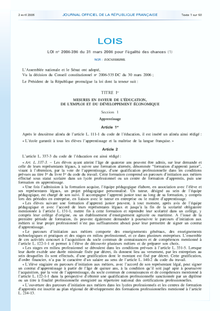First Employment Contract
Article 8 of the 31 March 2006 Equality of Opportunity Act, establishing the CPE, was repealed by a 21 April 2006 law on the Access of Youth to Professional Life in Firms.This law was proposed by Prime Minister Dominique de Villepin allegedly to tackle a 23% unemployment rate among the young,[1] and also as a response to the civil unrest in October 2005.The student movement as well as all trade unions (including the CGT) and the Socialist Party asked not only for the suppression of the CPE but also of the CNE, a similar contract passed in November 2005 by the same government.On 10 April, as the protests were still getting bigger, the government completely withdrew the law, and substituted for it fiscal incentives to firms employing young people.The CPE sparked debates among the political classes, and drew massive protests from students in the streets of France, along with sudden strikes.Instead of putting the clauses creating CPE inside the bill it was proposing to Parliament, the government chose to submit it as an amendment of its own text.This last measure has been for a long time in the program of the far-right movement Front National, thus also explaining part of the popular protests.They claim that unemployment is partially caused by the restrictive labor laws which they believe have also helped keep economic growth at a low level by discouraging business foundation and expansion.Some opponents dubbed it the "Kleenex contract", implying that the CPE would allow employers to discard young people like facial tissue.The law has met heavy resistance from students, trade unions, and left-wing activists, sparking protests in February and March 2006 (and continuing into April) with hundreds of thousands of participants in over 180 cities and towns across France.The Socialist deputies and senators who had deposed the legal recourse before the Constitutional Council notably claimed that the law was superseded by article 24 of the European social charter, which states that the employer must give a juridical motive before firing an employee, and against the International Labour Convention (n°158).Chirac's paradoxical call (officially promulgating the law while unofficially asking at the same time for its suspension) has only baffled both partisans and opponents of the text.The president's move was widely analyzed by the press as support for his prime minister Dominique de Villepin against his 2007 election rival, Nicolas Sarkozy, who was the leader of Chirac's political party, the UMP.

employment contractPrime MinisterDominique de Villepinmassive protestsJacques Chiracstudents' protestsamendmentunemployment ratecivil unrest in October 2005burden of proofFrench National AssemblyConstitution of FranceConstitutional CouncilUnion for a Popular MajoritySocialist PartyConseil d'ÉtatJean-Louis Debréapprenticeshipspublic educationwelfareskip schoolFront NationalFrenchemployersindefinite contractlegal recourseunjustlyjust causeunemploymentjob securitylabor lawseconomic growthliberalsCGC-CGEstudents' unionleft-wingcentristUnion for French Democracysexual harassmentKleenexfacial tissueworking poorprecarityEuropean social chartersocialist2006 labor protests in Francetrade unionsactivistsprotestsuniversitiesBernard Thibaultgeneral strikerepealedToulouseinternationalEuropean lawInternational Labour ConventionPresidentChiracpromulgateNicolas SarkozyPlace de la BastilleHôtel de VilleOpéraContrat nouvelle embaucheLabor lawArchives de sciences sociales des religionsLe MondeJURIST